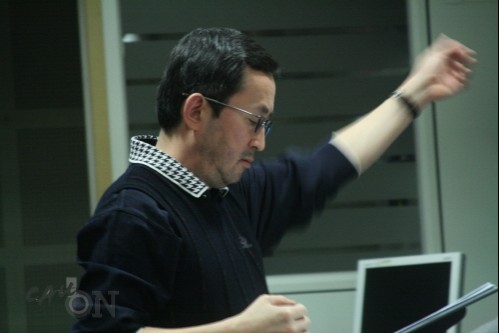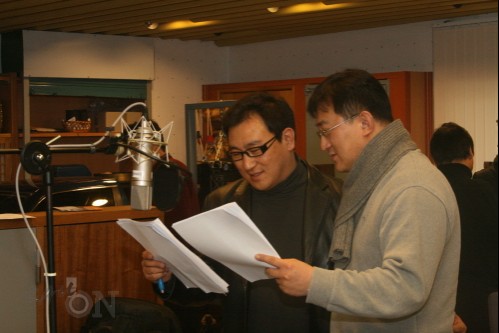
Recently, a radio drama named ‘Radio Days’, which is about Korea during the Japanese colonial rule, was released. It has shed new light on radio dramas. We wanted to focus on that, so one day in February, when the weather was warm; the Chung-Ang Herald visited a recording studio. The recording studio is where the radio drama 'Turbulence- 50 years' is being broadcast. It is only played on MBC (Munhwa Broadcasting Corporation) radio. CAH interviewed Oh Sung-soo the Producer and Won Ho-seop a voice actor after they finished recording the next week’s radio program.

- Voice Act
CAH: Is it difficult to act through sound only?
PD: It is fine, if we work along time together.
VA: We can know whether an act is working or not by making mutual eye contact, while we are working together. By being eagle-eyed, we get a feeling of "Oh, it is not that." We sympathize with one another through mutual agreement.
- From making a radio program to broadcast
CAH: What process do you pass through to get the dramatic feeling of our history in a radio drama?
PD: We record testimonies of the people concerned in the same situation as in the drama. We meet with them, make an appointment to talk, and record their voice. As these people’s way of life come out in the broadcasts, the radio audience can form opinions about them. There is a possibility of defamation, privacy infringement, etc. Therefore, we aim for a policy of manufacturing dramas that are positive and objective. In addition, we always seek advice from a lawyer.
- A sensitive present-day history.
CAH: There are many modern problems to be sensitive about because you draw attention to contemporary history. About this, do you feel pressured to focus on somebody, or did not criticize someone? We are curious about the people in the episodes.
PD: Sometimes, people ask for protection against some of our radio transmissions. Many people will start a lawsuit. When another PD was in charge of this program, a lawsuit came, and we lost. Therefore, if it is a sensitive affair, we use an anonymous name instead of a real name. If we do that in an episode… and if there is a carefully listening person, (I am thankful for that.) or if there is a person who heard the story, while it was being recorded and understood and we are using an anonymous name, they are usually grateful.
- Analog radio drama
CAH: How do modern people who are familiar to visual media respond to radio drama?
PD: The people, who have heard our program, listen continually. The elderly, who spend the season listening, than encourage young people to listen and they do; only radio has some attractiveness that encourages people to continuously listen.
- Only radio
CAH: Compared to TV dramas, what is the charm of radio dramas?
VA: I think that it is effective sounds. Radio dramas force us to listen, not to what we see; it stimulates the imagination of people. There are separate specialists to let out various sound effectives. For example, there may seem to be shoed feet sound, or the sound of shoes while a person walks in a straight line.
PD: In case of TV historical dramas, several supporting performances and props are necessary to make a scene. However, we can deal with the scene using a word. It is so simple.

- Non-mainstream
CAH: The radio drama is not in mainstream media. Why did you undertake this program?
PD: When I was young, radio dramas were in vogue, so I listened to them a lot. After becoming a producer, I wanted to direct them, but senior producers decided to stop, because radio dramas were declining. As it is unpopular, people will not make them. Even if they do, I would stop them.
- The future
CAH: What is the plan for radio drama development?
VA: For KBS (Korean Broadcasting System), there are a few radio dramas. Broadcast time is in the early morning or late at night. Listeners find it hard to connect with KBS radio dramas, and there are too many channels, so that accessibility is not good. On the other hand, as 'Turbulence 50 years' broadcasts in the daytime, listeners can easily connect with the radio station. Our program is popular.
PD: There is no specific way, the trend is the audiences are continually coming and leaving, but they have to listen to the radio drama.
- How long?
CAH: How long will ‘Turbulence 50 years’ last?
PD: Until Korean society becomes clean. Wherever political corruption continues, we have irrational distribution of plentiful materials, or as scandals occur, we will have abundant subject matter to broadcast.
With some good luck, a radio drama called 'classic theater' will be created at EBS (Educational Broadcasting System). The life of a radio drama will be able to stay alive.
While movies or entertainment programs appear on radios, the radio is creating nostalgia. Radio is no longer the exclusive property of the older generation. If radio grows up, it will become a familiar ‘friend’ that tells our life to the following generation.

